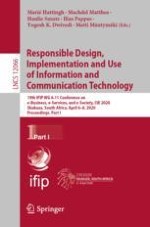2020 | OriginalPaper | Chapter
The Role of Information Technology in Fintech Innovation: Insights from the New York City Ecosystem
Author : Stanislav Mamonov
Published in: Responsible Design, Implementation and Use of Information and Communication Technology
Publisher: Springer International Publishing
Activate our intelligent search to find suitable subject content or patents.
Select sections of text to find matching patents with Artificial Intelligence. powered by
Select sections of text to find additional relevant content using AI-assisted search. powered by
